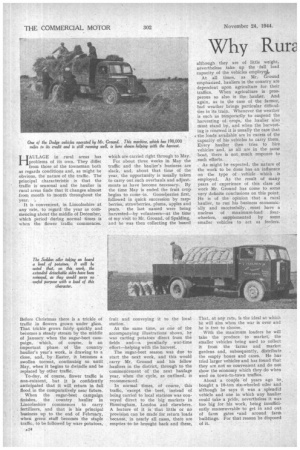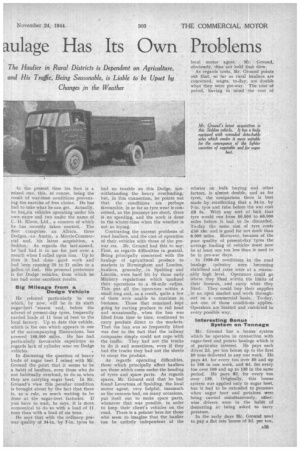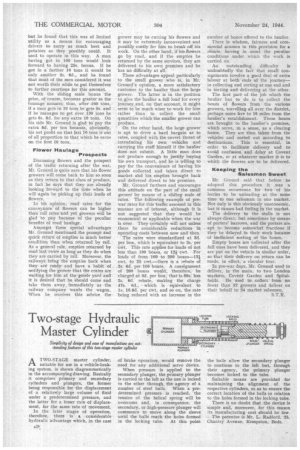Why Run aulage Has Its Own Problems
Page 26

Page 27

Page 28

If you've noticed an error in this article please click here to report it so we can fix it.
HAULAGE in rural areas has problems of its own. They differ from those of the townsman both as regards conditions and, as might be obvious, the nature of the traffic. The principal characteristic is that the traffic is seasonal and the haulier in rural areas finds that it changes almost from month to month throughout the year. .
It is convenient, in Lincolnshire at any rate, to regard the year as commencing about the middle of December, which period during normal times is when the flower traffic commences.
Before Christmas there is a trickle of traffic in flowers grown under glass. That trickle grows fairly quickly and becomes a steady stream by the middle of January when the sugar-beet campaign, which, of course, is an important phase of the country haulier's year's work, is drawing to a close, and, by Easter, it becomes a swollen torrent, continuing so until May, when it begins to dwindle and be replaced by other traffic.
To-day, of course, flower traffic is non-existent, but it is confidently anticipated that it will return in full flood in the comparatively near future.
When the sugar-beet campaign finishes, the country haulier in Lincolnshire commences to carry fertilizers, and that is his principal business up to the end of February, when green stuff becomes the staple traffic, to be followed by ware potatoes. which are carried right through to May.
For about three weeks in May the traffic and the haulier's business are slack, and, about that time of the year, the opportunity is usually taken to carry out such overhauls and adjustments as have become necessary. By the time May is ended the fruit crop begins to come in. Gooseberries first, followed in quick succession by rasp• berries, strawberries, plums, apples and pears. the last named were being haryested—by volunteers—at the time of my visit to Mr. Ground, of Spalding, and he was then collecting the boxed fruit and conveying it to the local station.
At the same time, as one of the accompanying illustrations shows, he was carting potatoes direct from the fields and—a peculiarly war-time effort—helping with the harvest.
The sugar-beet season was due to start the next week, and this would carry Mr. Ground and his fellow hauliers in the district, through to the commencement of the next haulage year, when the cycle, as outlined, is recommenced.
In normal times, of course, this traffic, except the beet, instead of being carried to local stations was conveyed direct to the big markets in Birmingham, London and elsewhere. A feature of it is that little or no provision can be made for return loads because, in nearly all cases, there are empties to be brought back and these. although they are of little weight, nevertheless take up the full load capacity of the vehicles employW, At _ all times, as Mr. Ground emphasized, hauliers in the country are dependent upon agriculture fortheir traffics. When agriculture is prosperous so also is the haulier. And again, as in the case of the farmer, bad weather brings particular difficulties in its train. Whenever the weather is such as temporarily to suspend the harvesting of crops, the haulier also must stand by, and when the harvesting is renewed it is usually the case that the loads available are in excess of the capacity of his vehicles to carry them. Every haulier then tries to hire vehicles and, as all are in the same boat, there is not much response to such efforts.
. As might be expected, the nature of the work to be done has an influence on the type of vehicle which is employed. As the result of many years of experience of this class of work Mr. Ground has come to some very definite conclusions on this point. He is of the opinion that a rural haulier, to run his business economically and sucassfully, , must have a nucleus of maximum-load fourwheelers, supplemented by some smaller vehicles to act as feeders.
That, at any rate, is the ideal at which he will aim when the war is over and he is free to choose.
With the maximum loaders he will take the produce to market, the smaller vehicles being used to collect it from the farms and market gardens and, subsequently, distribute the empty boxes and cases. He has tried larger vehicles and has found that they are not so convenient and do not show the economy which they do when used on town-to-town traffics.
About a couple of years ago he bought a 10-ton six-wheeled oiler and although he says it was a splendid vehicle and one in which any haulier could take a pride, nevertheless it was too big for his work, being insufficiently manceuvrable to get in and out of farm gates 'and around farm buildings. For that reason he disposed of it. kt the present time his fleet is a mixed one, this, of course, being the result of war-time conditions preventing the exercise of free choice. He has had to take what he can get. Actually, he has,„shr vehicles operating under his ownname and two under the name of C. H. Elwes, Ltd., a concern of which he has recently taken control. The fleet comprises. an Albion, three Dodges, an Austin, a Morris-Commercial and, his latest acquisition, a Seddon. As regards the last-named, he had had it in use for just over a month when I called upon him. Up to then it had done good work and had been running 20 to 21 miles to a gallon of fuel. His personal preference is for Dodge vehicles, from which he has had some excellent results.
Big Mileage from a
Dodge Vehicle He referred particularly to one which, by now, will be in its sixth sugar-beet 'season and, before the advent of present-day tyres, frequently carried loads of 11 tons of beet to the local factory. Up to date this vehicle, which is the one which appears in one of the accompanying illustrations, has covered 198,000 miles. He has had particularly favourable experience as regards lack of cylinder wear on Dodge vehicles.
In discussing the question of heavy loads of sugar beet I raised with Mr. Ground the point that it seems to be a habit of hauliers, even those who do not habitually overload, to do so when they are carrying sugar beet, In Mr. Ground's view this peculiar condition is brought about by the fact that there is, as a rule, so much waiting to be done at the sugar-beet factories. If you have to wait, he says, it is more economical to do so with a load of 11 tons than with a load of six tons.
lie says that with the ordinary prewar quality of 34-in. by 7-in. tyres he had no trouble on this Dodge, notwithstanding the heavy overloading,. but, in this connection, he points out that the conditions are perhaps favourable, in so far as tyre wear is concerned, as the. journeys are short, there is no speeding, and the work is done in the winter-time when the weather is not so trying.
Contrasting the current problems of road hauliers, and the cost of operation of their vehicles with those of the prewar era. Mr. Ground had this to say: First, as regards difficulties in general. Being principally concerned with the haulage of agricultural produce to markets in Birmingham and London, hauliers, generally, in Spalding and Lincoln, were bard hit by those early Ministry regulations which confined their operations -to a 35-mile radius. This put all the, operators within a small ring and, as a result, quite a few of them were unable to continue in business. Those that remained kept going by carting produce to rail head and occasionally, when the ban was Lifted from time to time, continued to carry produce direct to the markets. That the ban was so frequently lifted was due to the fact that the railway companies simply could not cope with the traffic; They had not the trucks to do it and sometimes, even if they had the trucks they bad not the sheets to cover the produce.
As . regards operating difficulties, those which principally affect hauliers are those which come under.the heading of tyres and spare parts. As regards spares, Mr. Ground said that he .had found Levertons of Spalding, the local motor agent, very helpful, inasmuch as the concern had, on many occasions, put itself out to make spare parts, whenever that was possible. in order to keep their client's vehicles on the road. There is a pointer here for those who seem to imagine that the haulier can be entirely independent of the local motor agent. Mr. Ground, obviously, does not hold that view.
• As regards 'costs, Mr. Ground points out that, so far as rural hauliers are concerned, wages, to-day, are double what they were pre-war. The cost of petrol, having iii Mind the cost of rebates on bulk buying and other factors, is almost double, and as for tyres, the comparison there is best made by recollecting that a 34-in. by 7-in. tyre and tube before the war cost E8 5s. With any sort of luck that tyre would run from 50,000 to 60,000 miles before it had to be discarded. To-day the same size of tyre .costs £1-0 16s. and is good for not mofe than 8,000 miles. Moreover, because of the poor quality of present-day 'tyres the average loading of vehicles must now be at least one ton less than it used to be in pre-war days.
In 1938-39 conditions in the road haulage industry were becoming stabilized and rates were at a reasonably high level, Operators could go -where they liked within the limits of .their licences, and carry what they liked. They could buy their supplies ,,in an open market and work throughout on a commercial basis. To-day. not one. of those conditions applies. . Operators are limited and restricted in every possible way.
Interesting Bonus System on Tonnage Mr. Ground has a bonus system which he operates in connection with sugar-beet and potato haulage which is of particular interest. He pays each driver 2d. per ton bonus up to the first 50 tons delivered in any one week. He pays 4d. for every ton over 50 and up to 100 in one week, and 6d. for every ton over 100 and up to 130 in the same period: He pays 8d. for every ton over 130. Originally, this bonus system was applied only to sugar beet, but it had to be extended to potatoes when sugar beet and potatoes were being carried simultaneously, otherwise drivers were in the habit of demurring at being asked to carry potatoes.
In the early days Mr. Ground used to pay a flat rate bonus of 3d. per ton,
but be found that this was of limited utility as a means for encouraging drivers to carry as much beet and potatoes as they possibly could. It used to operate in this way. A man having got in 100 tons would look forward to having 25s. bonus. If he got in a further 10 tons it would be only another 25. 6d., and he found that most of the men considered it was not worth their while to put themselves to further exertions for this amount.
With the sliding scale bonus the prize, of course, becomes greater as the tonnage mounts; thus, after 400 tons, if a man gets in 10 tons he gets 5s. and if he manages to get over 130 tons he gets 6s. 8d. for any extra 10 tons. On his side Mr. Ground is glad to pay the extra 8d. per ton because, obviously, his net profit on that last 10 tons is out Of all proportion to that which he earns on the first 10 tons, .
Flower. Haulage
Prospects Discussing flowers and the prospect of the traffic returning after the war, Mr. Ground is quite sure that his flower growers will come back to him so soon as they return to that class of produce, in fact he says that they are already looking forward to the tinie• when he will again he picking up their loads of flowers.
In his opinion, road rates for the conveyance of flowers can be higher than rail rates and yet growers will be glad to pay because of the peculiar benefits of road haulage.
Amongst these special advantages Mr. Ground mentioned the prompt and quick return of empties in much better condition than when returned by rail. As a general rule, empties returned by road last twice as long as they do when they are carried by rail. Moreover, the railways bring the empties back when they are ready and have a habit of notifying the grower that the crates are waiting for him at the goods yard•and it is desired that he should com& and take them away, immediately as the railway company wants the wagon. When he receives this advice the
grower may be cutting his flowers and it may be extremely inconvenient and possibly costly for him to break off his work. On the other hand, if his flowers go by road, and if the empties be returned by the same services, they are delivered to his own premises and he has no difficulty at all.
These advantages appeal particularly to the small grower who is, in Mr. Ground's opinion, a more satisfactory customer to the haulier than the large grower. The latter is in the position to give the haulier a full load for every journey, and, on that account, it might seem to be much wiser to work for him rather than to collect the small quantities which the smaller grower can produce. On the other band, the large grower is apt to drive a hard bargain as to rates, coupled with the covert threat of introducing • his own vehicles and carrying the stuff himself if the haulier does not submit, A little man does not produce enough to justify buying his own transport, and he is willing to pay for the convenience of having his goods collected and taken direct to market abd his empties brought back and delivered direct to his premises.
Mr. Ground furthers and encourages this attitude an the part of the small growei by means of a sliding scale of rates. The following example of prewar rates for this traffic assessed in this manner are of interest, although it is not suggested that they would , be economical or applicable when the war is over. They certainly will not unless there be considerable reductions in operating costs between now and then.
The rates were standardized at 3d. per box, which is equivalent to 2s. per cwt. This rate applies for loads of not less than 100 boxes, or 12i cwt. For loads of from • 100 to 200 boxes—l2 cwt. to 25 cwt.—there is a rebate of 2s. 6d. per 100 boxes. A consignment of 200 boxes would, therefore, be charged at 3d. per box, that is 50s. less 2s. 6d. rebate, making the charge 47s. 6c1., • which. is • equivalent to Is. 10.8d. per cwt. and so on, the rate being reduced with an increase in the
number of boxes offered to the haulier.
There is wisdom, fairness. and commercial acumen in this provision for a rebate, having in .mind the peculiar conditions under which the work is carried on.
An outstanding difficulty is undoubtedly the fact that small consignments involve a good deal of extra labour at both ends a the journey— in collecting and sorting at one end and in sorting and-delivering at the other.
The first part of the job which the haulier has to do is to collect the boxes of flowers from the various growers, travelling all over the district, perhaps some five to 10 miles from the haulier's establishment. These boxes are brought to the haulier's premises, which serve, in a sense, as a clearing house. They are then taken from the vehicles and sorted out according to destinations, This is essential, in order to facilitate delivery and to avoid confusion and delay at Covent Garden, or at whatever market it is to which the flowers are to be delivered, Keeping the Salesmen Sweet' Mr. Ground said that before he adopted this procedure it was a common occurrence for two of his lorries to be unloading at the. same time to one salesman in one market. Not only is this obviously uneconomic, but it causes bad feeling in the market.
The delivery to the stalls is not always direct, but sometimes by means of porters' barrows, and the porters are apt tobecome somewhat fractious if they be delayed in their work because of inefficient sorting. of the boxes.
Empty boxes are collected after the full ones have" been delivered, and they are put on the vehicle in similar order, so that their delivery on return can be made, in effect, a circular tour.
In pre-war days, Mr. Ground used to deliver, in the main, to two London markets, Covent Garden and Spitalfields. He used to, collect from no fewer than 32 growers and deliver on their behalf to 24 market salesmen.




















































